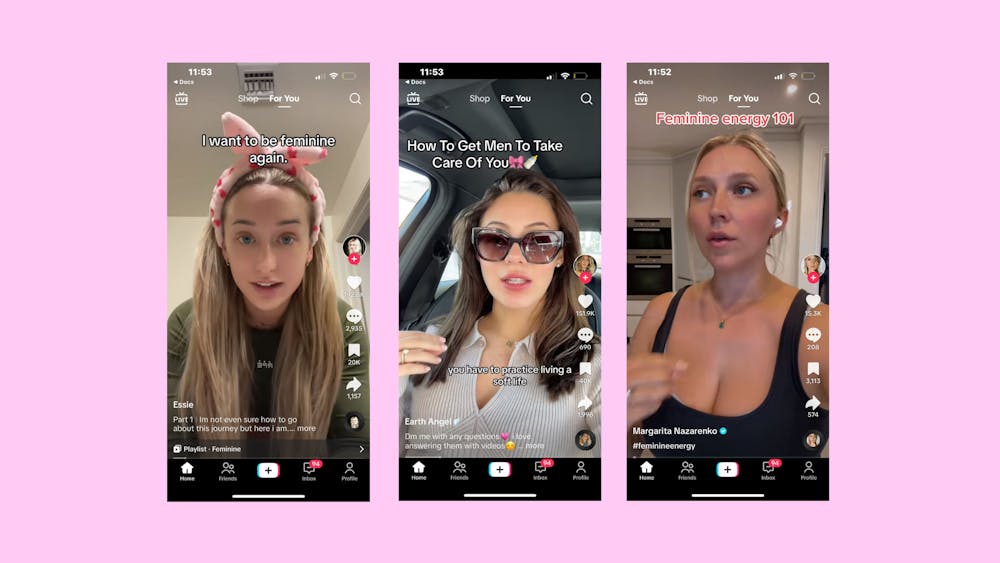New-age spirituality always seems to fare suspiciously well on TikTok. From manifestation love spells to green witchcraft, my “For You” page has been dominated by one spirituality trend after another. I present to you the latest addition to the TikTok Spirituality Hall of Fame: “feminine energy.” The tag #femininenergy has 5.1 billion views on TikTok, and if you search through the suggested videos, you would find beautifully made-up women preaching on “Feminine Energy 101.”
I first stumbled upon this term when I was watching a video by content creator @essiebone where she begins by saying she is in “her era of being more feminine.” She remarks how, because she has been independent from a young age, she feels more in touch with her masculinity. In the comments, several users agreed, expressing that they wanted to lean more into their femininity through meticulous beauty routines and Mia Thermopolis-esque wardrobe makeovers. Following that video, Bone took viewers on a “feminine energy” journey, fully embracing her femininity by pink-ifying her wardrobe, religiously doing her hair and makeup everyday, and taking a step back from grindset culture.
Going down this rabbit hole further, I entered some disturbing territory. In a video titled “How To Get Men To Take Care of You” the creator @earthangelariana advises women to “genuinely to feel like a little girl again.” When asking a man to do something, instead of feeling like you could do it yourself, Ariana says to “feel like this man's daughter.” Yikes. #daddyissues. Tied in with sentiments that Freud would have a field day over, this creator advises women to regress to a child-like, helpless state in order to get a man to give them what they desire. Ariana may feel like this works — but at what cost? Sacrificing your autonomy for the temporary whims of a man?
The underlying spiritual basis for this line of thought is that regardless of our biological sex, everyone has a certain balance of masculine and feminine energy. The concept stems from Chinese philosophy involving Yin and Yang. Yin is associated with feminine energy, symbolizing dark, cold, passive power, and Yang correlates with masculine energy, symbolizing light, warmth and action. However, the TikTok-ification of feminine and masculine energy does not include Yin and Yang in its definition. It aligns more with the general idea of feminine energy as the “being” mode with an intuitive mind supporting creativity, fluidity and empathy. Masculine energy is the “doing” mode with a logical mind, which is achieving, goal-oriented and driven.
I can get behind the idea of balancing the ambitious and more nurturing qualities in oneself to be the best version of themselves they can be. However, it is difficult for me to comprehend why these neutral qualities — qualities that anyone can hold — have to be divided in a shallow, gender normative manner. We have come so far in culturally accepting that women can do anything a man can do, even to an ad nauseam amount with the “Girl Boss” era of the 2010s, so the idea that being logical or driven are inherently masculine traits is regressive and disappointing to see in the mainstream — the same mainstream that perpetuates the standard of “strong independent women” who become corporate boss babes.
One might wonder why flocks of young women on TikTok are suddenly trying to revert back to 1950s gender norms by embodying feminine energy. Many women cite that they feel burned out by their independence and their search for a male partner. As follows, dating coaches make up a large demographic of feminine energy supporters. In their videos, they often make women feel like they have to tone down their success and career goals in order to seem more “feminine” and thus appealing to men. The creator @_womenwisdom_ advises that the only way for a woman to be in her feminine era is “when a man is a provider and a protector.” The subtext of that statement suggests that a woman has to allow a man to be a provider, meaning that they cannot support themselves in order to meet this goal post.
Because of the underlying search for male validation, feminine energy content is disproportionately appearance-oriented, such as “go to sleep cute” by subbing ratty old t-shirts for lingerie or silk sets. Semi-positive dating advice might be to be more open and not as closed off or hostile, but instead, women are tapping into their feminine energy by aligning with superficial gender norms. Like Essie Bone mentioned in her TikTok series, women are buying completely new wardrobes and wearing more makeup to appear more feminine. However, would wearing sexy pajamas to bed really revolutionize someone’s dating life or interpersonal relationships? Or is it just a strategy to get women to buy lingerie?
In truth, changing one’s external appearance is a shallow solution that does not actually level-up somebody’s life. Rather, it is just another consumerist trap for women to spend more money in the pursuit of genuine emotional fulfillment and personal development.
I can sympathize with women who desire someone to take care of them. However, becoming the embodiment of femininity will not solve the relationship issues women face. One can walk away with the goal of attaining some of the qualities associated with these “energies,” but it does not have to be rooted in gender. Everyone should cultivate ambitiousness, intuition, creativity, action, or dominance in themselves, regardless of gender associations. It’s time for feminine energy to enter the TikTok trend graveyard, now that the app itself will likely soon be banned.
Get The Chronicle straight to your inbox
Sign up for our weekly newsletter. Cancel at any time.
Olivia Prusky is a Trinity sophomore and a social media editor for Recess.

